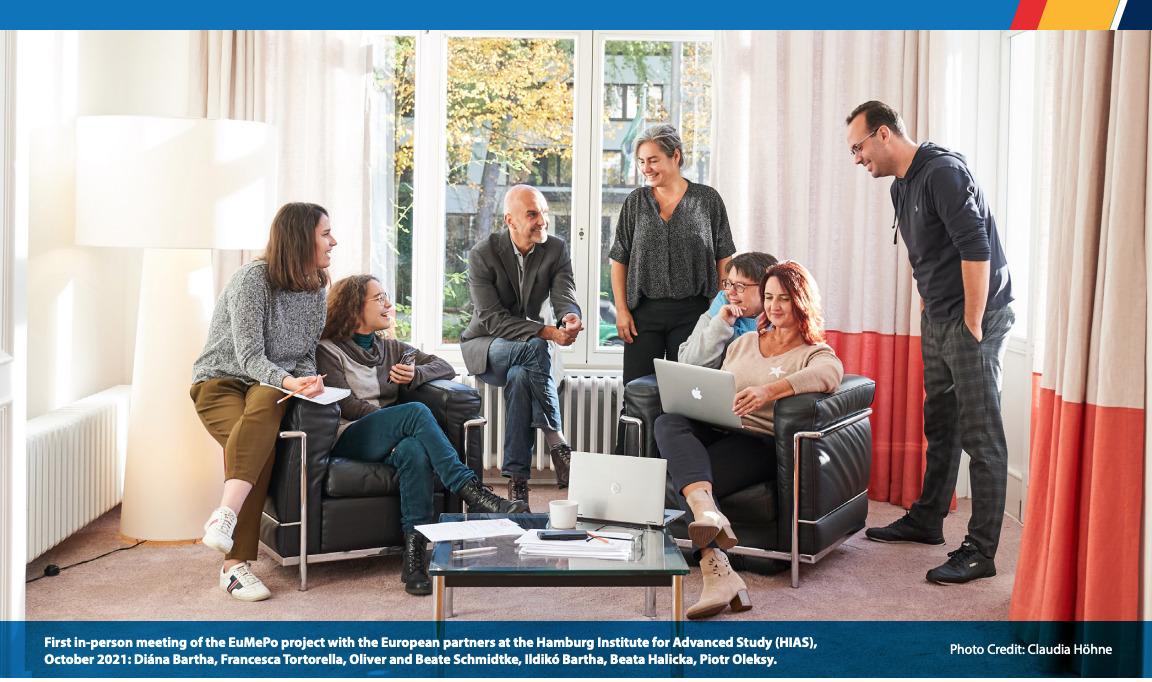Reflecting on EUCAnet’s Busy Year 2021-2022
Beate Schmidtke, EUCAnet Co-Lead
This year, as the world slowly transitioned away from strict pandemic restrictions the Europe-Canada Network’s (EUCAnet) vibrant community of scholars, fellows, and interns continued to thrive, engaging in a series of activities to deepen its network and train interns in Germany, England, and Canada. During the year, EUCAnet organized several in-person events with their European partners, had a range of online events, and produced various outputs, including one major publication. The primary area of activity was the European Memory Politics (EuMePo) project, a collaborative research network comprised of scholars from the University of Victoria, the Adam Mickiewicz University in Poznań, the University of Strasbourg, and the Eötvös Loránd University in Budapest. Together, this network studies and reflects on the link between past injustices and contemporary political and social realities, relying on perspectives from both sides of the Atlantic. The relevance of this work was made especially clear in the wake of Russia’s invasion of Ukraine, as President Putin used a widely-criticized account of Ukrainian history to justify his geopolitical aims. The Jean Monnet Network met on three occasions. It organized conferences in Hamburg in November (Populism, Nationalism and the Politics of Memory in Europe), Strasbourg in March (European Memory versus Populism and Euroscepticism in Western Europe), and Poznan in May (Politics of History and Memory Conflicts in Post-Communist Europe). These events were fruitful opportunities for the wider team to meet and collaborate, and they involved widespread participation from the university communities where they took part. In addition, great strides were made in advancing the goals of EuMePo network through a series of online events. An interview series of ten experts, including a former U.S. Ambassador, several top-notch memory politics scholars, and the long-term director of Berlin’s leading international art centre, was completed in January. And, the webinar series that began in 2021 saw several new installments: Justifying War Through History: Memory Politics and the Russian Invasion of Ukraine (May 2nd 2022) and Contesting National Memory in Canada: The Role of the Right (June 23rd 2021).
However, the capstone achievement of the year was undoubtedly the digital publication “Using the Past to Define the Present: An Introduction to Memory Politics,” a project that took over a year to research, write, edit, and design. It is a unique and engaging educational resource which unpacks the concept of ‘memory politics’, through five national case studies (its official launch is in October 2022). Beyond this EuMePo work, the EUCAnet team also finalized and launched the project’s new website, a tremendous effort given the amount of content, expert profiles, and multimedia the website offers. Furthermore, EUCAnet deepened its longstanding cooperation with the European Community Studies Association of Canada (ECSA-C), helping publish its 25 year anniversary brochure and organizing a related social media campaign. Moreover, the EUCAnet team was instrumental in facilitating a book entitled Democratic Multiplicity. Perceiving, Enacting, and Integrating Democratic Diversity (coedited by, among others, by the CFGS-affiliated J. Tully, K. Cherry, P. Ouziel and O. Schmidtke). The book is based on the 2019 EUCAnet conference on Democracy and its Futures and was published by Cambridge University Press in August 2022.


